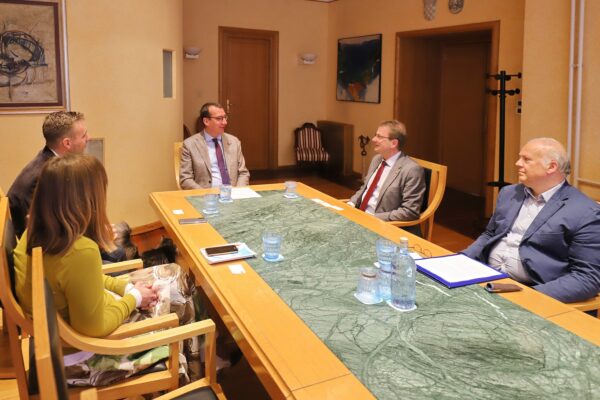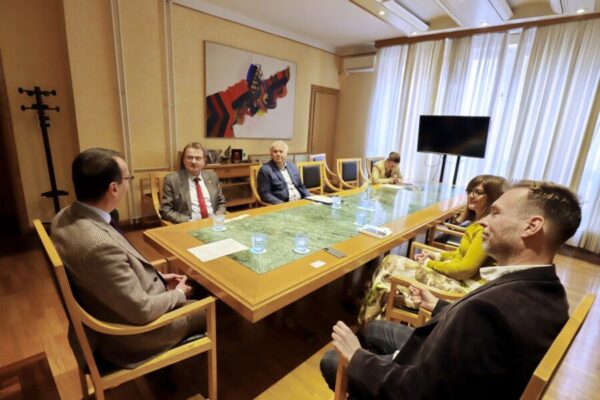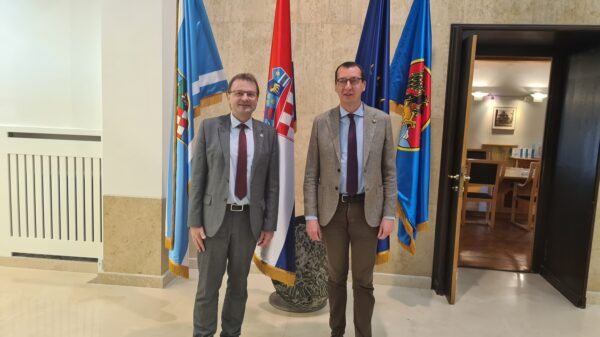
Marko Filipović, mayor of Rijeka and Hannes Heide, member of the European Parliament exchanged views on European Capital of Culture and EU cohesion policy and talked about the experiences of the Rijeka – European Capital of Culture project, challenges during its implementation and disturbances caused by the Covida pandemic.
Mr. Hannes Heide is a member of the European Parliament (S&D / Austria), former mayor of Bad Ischl and Chairman of the Supervisory Board of Bad Ischl / Salzkammergut 2024 Capital of Culture.
In addition to Mayor Filipović and MEP Heide, the meeting was attended by Ivan Šarar, head of the Department of Culture, Suzana Belošević Romac, mayor’s senior EU project adviser and Srđan Škunca, Head of the Department of Development, Urbanism, Ecology and Land Management.

Working session with a member of the EU Parliament Hannes Heide
Expressing his satisfaction with the visit paid by the member the EU Parliament Hannes Heide, Mayor Filipović said that the working session was about the legacy of European Capital of Culture, especially as regards infrastructure and also the huge experience gained by those took part in the project, including many volunteers . “Despite the COVID pandemic that broke out in March, we managed to complete the project, realsed almost two-thirds of the programme and had a large number of visitors. We exchanged experiences related to the company that managed the ECOC 2020 project and I hope that our experiences will help Bad Ischl to draw down as many European funds as possible. We also talked about the European Commission’s attitude towards culture, as Mr. Heide is a member of the European Parliament’s Committee on Culture, Sport, Languages and Media. In this context, we touched the part related to the EU financial perspective in the period 2021-2027, where the role of the European Parliament is emphasised, both in cohesion and cultural policies, with the desire of the Committee on Culture and the European Parliament that the funds be higher and available to everyone”, said Filipović.

Marko Filipović, mayor of Rijeka and Hannes Heide, member of the European Parliament
Hannes Heide said that he was interested in the realisation of the European Capital of Culture project in Rijeka, precisely because of the pandemic. “The ECOC project is one of the most important and influential EU projects. At one time, as the mayor of Bad Ischl, helding that position for 12 years, I was extremely concerned about developing my city and the entire region through culture. We ran for a Capital of Culture even though we didn’t believe that a city with about 40,000 inhabitants and a region with a hundred thousand could even get a chance to become one. Now, as a member of the Committee on Culture, I am very interested in the way in which European funds for culture and those intended for regional development are spent. Your county, and especially the City of Rijeka, are the best examples of how to develop an urban region through EU funds. I followed the development of Rijeka, because my city – Bad Ischl fosters friendly relations with the City of Opatija, so I have often visited Rijeka. For me, this conversation with the mayor of Rijeka was inspiring because I learned how good results in the development of the city and the region can be achieved through the ECOC project. I believe that the influence of the European Union must be felt above all in our cities and regions. Your rich heritage of ECOC and the experience you have gained shows us how local governments improve through this project. Rijeka is a leading example of urban and cultural development. I will try to concretize the topics I discussed through the work of the Committee on Culture, especially when it comes to projects such as ECOC, regional development financing projects, Creative Europe and partly the Interreg project,” said Heide.
Heide briefly presented the basic guidelines of the Bad Ischl / Salzkammergut European Capital of Culture 2024 project to the media.

